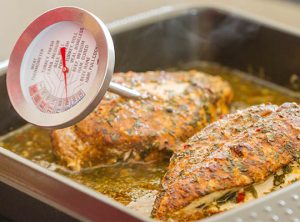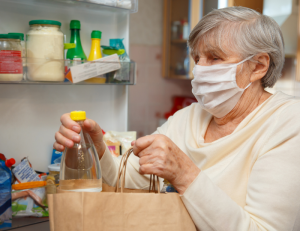There has been a renewed emphasis on food safety, handwashing, and other personal hygiene practices with the COVID-19 pandemic. Foodborne illness has been known for years to affect an estimated 48 million people each year with approximately 128,000 hospitalizations and 3,000 deaths. https://www.cdc.gov/foodborneburden/index.html That number has been way too high!
It looks like we have been doing our part to
lower that estimate by approximately 26%.

- According to the latest CDC report (FoodNet) which stated that foodborne illness in 2020 was reduced by 26% compared to the period of 2017-2019. The Centers for Disease Control and Prevention reported that its FoodNet surveillance system identified a decreased number of infections (18,462) including hospitalizations (4,788) and deaths (118), according to the Morbidity and Mortality Weekly Report from the Center for Infectious Disease Research and Policy (CIDRAP). https://www.cdc.gov/foodnet/reports/prelim-data-intro-2020.html The numbers from 2021 are not available yet.

- This impressive 26% overall decrease was the largest single-year change in incidence during 25 years of FoodNet surveillance. The extent to which these reductions reflect actual decreases in illnesses is unknown, so we need to stay tuned for more information.
The core food safety principles (clean, separate, cook and chill) are meant to help us keep food free from harmful microorganisms and safe for families and consumers to eat. Let’s keep this downward trend going! Following these four (4) principles can keep the incidence of foodborne illness low, in your home.

- CLEAN- Keep your hands and kitchen clean! Wash your hands with soap and water for 20 seconds before and after handling food, after using the restroom, touching pets, changing diapers, sneezing, and/or blowing your nose. Wash kitchen surfaces such as countertops, utensils, kitchen gadgets, utensils, cutting boards and kitchen sinks. Consider sanitizing your garbage disposal with a small amount of household kitchen bleach. Clean kitchen hand towels often and consider using disposable paper towels to clean kitchen surfaces and to dry clean hands. Wash fresh produce under running water before chopping and/or eating. Use a vegetable brush as needed to remove dirt and debris from produce.

- SEPARATE-Keep raw and cooked foods separated. Bacteria can be spread through cross-contamination, which can cause foodborne illness. Make sure you are separating raw meat, eggs, seafood, and poultry from bread, and raw produce. (This practice of separation keeps the bacteria on food separate and keeps it from spreading.) Use a separate cutting board for bread and produce, and raw meat, poultry, and seafood. Never place cooked food on a plate/platter that previously held raw food. This is often overlooked when people grill out meat, poultry, and/or seafood.

- COOK – Food must be cooked to a safe internal temperature to prevent foodborne illness. Safe temperatures have been studied and researched by food safety scientists for years. They have come up with recommended temperatures/ temperature charts which have been shown to kill the harmful bacteria that cause foodborne illnesses. Use a food thermometer to test for the correct internal temperature. Insert the food thermometer into the thickest part of the food item. Here is a temperature chart to use as a reference: https://www.fsis.usda.gov/food-safety/safe-food-handling-and-preparation/food-safety-basics/safe-temperature-chart

- CHILL – Cold temperatures can slow the growth of harmful bacteria. Perishable groceries should be placed in the refrigerator or freezer immediately. Cooked foods should be refrigerated or frozen promptly too. Do not overfill your refrigerator or freezer, as cold air needs to circulate around the food inside to keep it at the recommended temperature. Refrigerator temperature should be maintained at 40 degrees Fahrenheit or lower and your freezer should be maintained at 0 degrees Fahrenheit or lower. Purchase a refrigerator and freezer appliance thermometer to help you keep track of the current temperature within each compartment.

These four food safety reminders can save lives. Food safety matters!
Check out this website for more information on food safety and extend your knowledge on this important topic. https://www.fightbac.org/food-safety-basics/the-core-four-practices/
UF/IFAS Extension is an equal opportunity institution and employer.
 8
8
